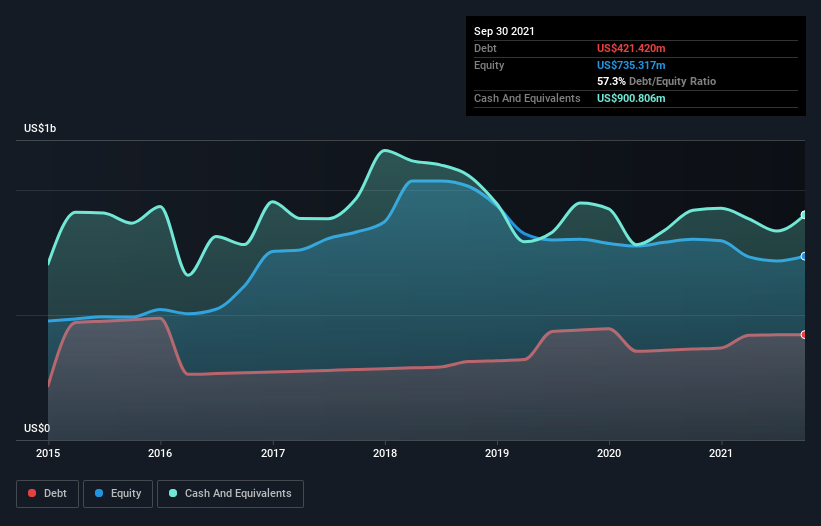InterDigital (NASDAQ:IDCC) Has A Pretty Healthy Balance Sheet
Warren Buffett famously said, 'Volatility is far from synonymous with risk.' So it might be obvious that you need to consider debt, when you think about how risky any given stock is, because too much debt can sink a company. Importantly, InterDigital, Inc. (NASDAQ:IDCC) does carry debt. But should shareholders be worried about its use of debt?
When Is Debt A Problem?
Generally speaking, debt only becomes a real problem when a company can't easily pay it off, either by raising capital or with its own cash flow. Ultimately, if the company can't fulfill its legal obligations to repay debt, shareholders could walk away with nothing. However, a more usual (but still expensive) situation is where a company must dilute shareholders at a cheap share price simply to get debt under control. By replacing dilution, though, debt can be an extremely good tool for businesses that need capital to invest in growth at high rates of return. The first thing to do when considering how much debt a business uses is to look at its cash and debt together.
View our latest analysis for InterDigital
What Is InterDigital's Debt?
The image below, which you can click on for greater detail, shows that at September 2021 InterDigital had debt of US$421.4m, up from US$363.5m in one year. But on the other hand it also has US$900.8m in cash, leading to a US$479.4m net cash position.
How Healthy Is InterDigital's Balance Sheet?
The latest balance sheet data shows that InterDigital had liabilities of US$418.0m due within a year, and liabilities of US$547.3m falling due after that. Offsetting these obligations, it had cash of US$900.8m as well as receivables valued at US$194.5m due within 12 months. So it can boast US$130.0m more liquid assets than total liabilities.
This surplus suggests that InterDigital has a conservative balance sheet, and could probably eliminate its debt without much difficulty. Simply put, the fact that InterDigital has more cash than debt is arguably a good indication that it can manage its debt safely.
The bad news is that InterDigital saw its EBIT decline by 11% over the last year. If that sort of decline is not arrested, then the managing its debt will be harder than selling broccoli flavoured ice-cream for a premium. When analysing debt levels, the balance sheet is the obvious place to start. But it is future earnings, more than anything, that will determine InterDigital's ability to maintain a healthy balance sheet going forward. So if you want to see what the professionals think, you might find this free report on analyst profit forecasts to be interesting.
Finally, a company can only pay off debt with cold hard cash, not accounting profits. While InterDigital has net cash on its balance sheet, it's still worth taking a look at its ability to convert earnings before interest and tax (EBIT) to free cash flow, to help us understand how quickly it is building (or eroding) that cash balance. Over the last three years, InterDigital actually produced more free cash flow than EBIT. That sort of strong cash conversion gets us as excited as the crowd when the beat drops at a Daft Punk concert.
Summing up
While it is always sensible to investigate a company's debt, in this case InterDigital has US$479.4m in net cash and a decent-looking balance sheet. The cherry on top was that in converted 100% of that EBIT to free cash flow, bringing in US$40m. So we are not troubled with InterDigital's debt use. The balance sheet is clearly the area to focus on when you are analysing debt. However, not all investment risk resides within the balance sheet - far from it. For instance, we've identified 5 warning signs for InterDigital (1 makes us a bit uncomfortable) you should be aware of.
When all is said and done, sometimes its easier to focus on companies that don't even need debt. Readers can access a list of growth stocks with zero net debt 100% free, right now.
This article by Simply Wall St is general in nature. We provide commentary based on historical data and analyst forecasts only using an unbiased methodology and our articles are not intended to be financial advice. It does not constitute a recommendation to buy or sell any stock, and does not take account of your objectives, or your financial situation. We aim to bring you long-term focused analysis driven by fundamental data. Note that our analysis may not factor in the latest price-sensitive company announcements or qualitative material. Simply Wall St has no position in any stocks mentioned.
Have feedback on this article? Concerned about the content? Get in touch with us directly. Alternatively, email editorial-team (at) simplywallst.com.

 Yahoo Movies
Yahoo Movies 

